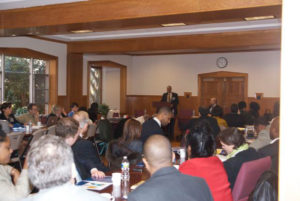IIPSJ IP Law and Policy Think Tank
From its inception in 2002, IIPSJ has developed and disseminated forward-looking ideas about social justice perspectives on and implications of intellectual property law. One of its earliest actions was sponsoring a symposium on IP and social justice which resulted in a number of published articles. It has also started an online library of relevant works. IIPSJ’s principals have presented papers, published articles, infuse their IP courses with social justice perspectives, and advocated social justice positions on various public issues.

In 2010 IIPSJ formalized this aspect of its social justice work with the creation of the IP Law and Policy Think Tank. The IIPSJ Think Tank works with ideas, of course, and it also actively engages target audiences both in the development and implementation of impact programs. While the Think Tank is always examining issues from the perspective of the effect of choices on social justice concerns, the IIPSJ Think Tank is structured flexibly to adapt to the evolving IP environment and various issues it presents.
The Think Tank's core activities are:
- Organizing and hosting scholarly symposia and policy roundtables,
- Hosting and sponsoring visiting scholars and fellows to introduce and develop topical initiatives and permanent programs;
- Conducting and sponsoring targeted research on social justice implications of IP law, policy, and administration;
- Writing, presenting, and distributing position statements and comments on IP-related initiatives by the United States and in the international realm;
- Developing and maintaining Information repositories and other resources for scholars, policymakers, IP creators, IP users, and IP entrepreneurs;
- Collaborating with other NGOs, pedagogical institutions, and IP-interest entities on each of these to further IIPSJ’s social justice objectives; and
- Developing and implementing programs ranging from professional conferences to workshops to hands-on mentoring and provision of services on identified issues.
The IIPSJ Law and Policy Think Tank is the only think tank dedicated to evaluating IP law and policy and related issues from the social justice perspectives of inclusion and empowerment. The Think Tank functions as an incubator for social justice-oriented IP legislative development and amendment; IP Civil Rights activism and community awareness, education, entrepreneurship, and empowerment; and scholarly and professional involvement on important national and international IP law and policy controversies.
The IIPSJ Think Tank uses a multi-disciplinary approach, designed to steward IP law and policy toward a more socially cognizant and equitable IP regime. The IIPSJ Think Tank generates and facilitates collaboration and discourse among legal, scientific, and economic scholars, as well as legislators, policymakers, jurists, practicing attorneys, and civil rights and social activists; conducts research, legislative briefings, public comments, and publications; and promotes and organizes community, activist, and professional coalition building.
The 2011-12 Think Tank program is designed to build upon the important relationships developed in the past year and to capitalize on IIPSJ’s unique achievements and national reputation. Through its past efforts and current plans, the IIPSJ Think Tank is well poised to become a prominent voice for IP-related social justice and civil rights interests.
Among its activities in the 2010-11 program year, the IIPSJ Think Tank:
- Organized the first National IP Social Justice Summit of IP government officials, policymakers, scholars, professionals, and community leaders;
- Conducted a Congressional Policy Briefing on IP and Civil Rights;
- Organized and hosted an IP and Social Justice Scholars Roundtable;
- Prepared and disseminated position papers and submitted comments to Congress and various governmental agencies regarding IP law and policy issues.
In 2011-12, the IIPSJ Think Tank will continue to do such work with particular emphasis on:
- A Legislative IP Social Justice Awareness Initiative, through which it will prepare and submit position statements, public comments, legislative proposals, and otherwise provide information to Congress and other legislative and governmental authorities regarding IP law amendment, enforcement, and social justice interests;
- An IP and Civil Rights Activism Project, through which it will further organize an IP Civil Rights Coalition for IP education, activism, and Digital Entrepreneurship; and
- An IP Scholar Activist Project, through which it will conduct and sponsor scholarly research, conferences, and publications intended to heighten legislative, judicial, practitioner, and social activist awareness of domestic and international IP social justice issues and options for change.
CLE Registration
Click the link below to register. The program annually qualifies for 4-6 CLE credit hours, including 1 hour of Ethics credit. CLE sign-up sheets will be on-site and CLE accreditation will be emailed after the program. 2019 CLE credit applications will be filed in California, Delaware, New Jersey, New York, Ohio, Pennsylvania, and Virginia. Additional fees may apply for applying for credit in additional states.
| Registration Fees |
| $150 All registrants not listed below |
| $50 Howard University Alumni, or multiple registrants from the same organization (unless listed below) |
| Registration is free for all Non-Profit, Governmental/Judicial, Public Interest Lawyers, and Full-time academic attendees. |
The first 50 individuals to contact us will receive free registration.
Venue and Directions
The 2019 IIPSJ CLE will be held at the Howard University School of Law in Washington D.C. The address for the law school is:
Howard University School of Law
2900 Van Ness St., N.W.
Washington D.C. 20008
Located in the beautiful Northwest district of Washington, DC, near the National Zoo, the Howard University School of Law is accessible by car, taxi, or Metro.
Driving Directions
Take Connecticut Avenue to Van Ness Street.
Turn east on Van Ness Street, and proceed past apartment buildings on both sides of the street.
The school is at the end of the cul-de-sac on Van Ness.
Parking is limited; Metro is recommended.
Metro Directions
Take the Red Line to the Van Ness/UDC station.
Take the Connecticut Avenue East Exit and walk left on Connecticut for two blocks until you reach Van Ness.
Turn left on Van Ness and proceed past apartment buildings on both sides of the street.
The Law School buildings face a circle at the end of the cul-de-sac.
